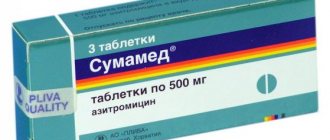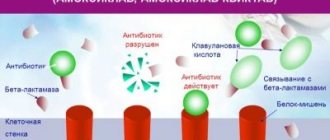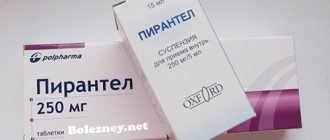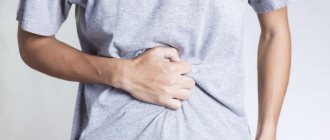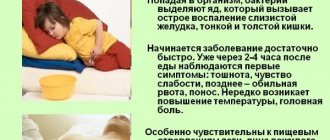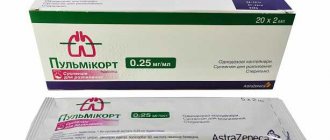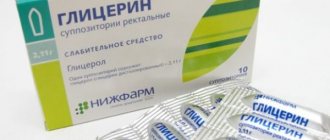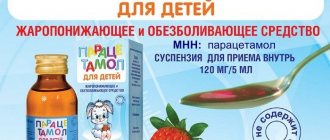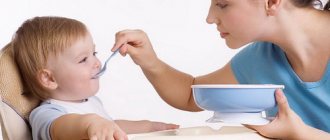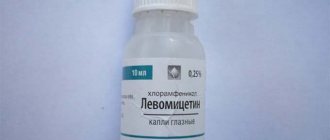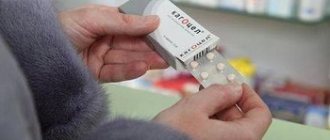Diarrhea is a symptom characterized by the appearance of loose stools, increased peristalsis of the gastrointestinal tract, and discomfort in the abdominal area. Often, such disorders are associated with the penetration of pathogenic microorganisms and their reproduction in the lumen of the gastrointestinal tract. Treatment of diarrhea in children has its own characteristics due to rapid dehydration of the body and the occurrence of associated complications. Let's figure out how to cope with stool disorders using the drug "Nifuroxazide" for a child.
Pharmacodynamics
When taken orally, the drug has low bioavailability, that is, it is practically not absorbed into the systemic circulation. Trace concentrations of nifuroxazide may be detected in blood plasma, while a small amount is excreted unchanged in urine. The rest is excreted in the feces. Due to the almost complete absence of absorption, the rate of elimination of the drug depends on the dose taken and the intensity of intestinal motility.
general description
Acute intestinal infections are often diagnosed in young children. Such diseases are transmitted through the fecal-oral route. That is, you can become infected with germs through unwashed hands, contaminated water, and food. The carriers of diseases are infected people. Bacteria most often enter a child’s body due to poor hygiene and sanitary standards. As a result, digestive disorders develop.
A drug such as Nifuroxazide will help the baby’s body cope with pathogenic microbes. The instructions recommend giving the suspension to children as prescribed by a specialist, because otherwise the child’s condition can only worsen. The drug is an antiseptic that has a pronounced antidiarrheal effect. To treat children, the product is used in liquid form, while tablets are suitable for adults.
Nifuroxazide is produced by several pharmaceutical companies from different countries. So, on sale you can find medicine produced in Romania, Uzbekistan, Russia or Poland. The average cost of the suspension ranges from 270-320 rubles.
https://youtu.be/WsqASK-1ylw
Spectrum of action of the drug
Being a nitrofuran derivative, Nifuroxazide has a bacteriostatic effect in medium therapeutic concentrations, and in higher doses it acts as a bactericidal drug with slow development of resistance. A fairly large number of both gram-positive (streptococci, penicillinase-producing staphylococci) and gram-negative microorganisms (Escherichia coli, salmonella, shigella, klebsiella, enterobacteria) are sensitive to the drug. In addition, the medication negatively affects various viruses, Trichomonas, Giardia and Candida fungi. The drug retains its effect in the presence of pus and other products of tissue decay in the wound.
Nifuroxazide is ineffective in the treatment of pseudomonas infections, as well as infections caused by microorganisms of the genus Proteus.
Indications for use of the drug "Nifuroxazide" (instructions for children)
The main indication for prescribing the drug is various types of intestinal infections caused by pathogens sensitive to the antibacterial drug. "Nifuroxazide" is prescribed for acute stool disorder of infectious origin, chronic inflammatory bowel diseases and enterocolitis. The drug is prescribed to patients with infected wounds (local use of the drug is possible), as well as during surgical interventions on the intestines (for sanitation) and in the complex treatment of dysbiosis.
It should be noted that in pediatric practice, the most commonly used drug for the treatment of intestinal disorders is Nifuroxazide. Instructions for children, with the exception of dosage, are similar to those for adults.
When should you be concerned if your child is vomiting?
If vomiting invariably recurs. If the baby regurgitates quite often and in large quantities (regurgitation of no more than one tablespoon is considered normal).
Vomiting of blood, mucus and bile.
Loss of appetite, refusal to breastfeed, diarrhea or constipation (no stool for 24 hours), unusual behavior (constant drowsiness or agitation), pallor, increased heart rate, cold extremities, strong crying are a pretext for anxiety. The situation is very scary, especially for small children. Most likely, the doctor will refer you for tests, but there is no time to wait for the results of the examination from time to time. Start functioning without delay!
The first thing to do is, as we have already said, to see a good expert who will determine the cause of vomiting and prescribe you adequate treatment. In the case of a very acute situation, it is better not to hesitate and immediately go to the clinic or take it to the emergency room. If this option is temporarily unavailable (for example, you are at a great distance from home, your doctor is away, etc.), take measures yourself.
Directions for use and doses
The drug is used regardless of food intake. For the treatment of adults, as well as children after the age of seven, the drug is taken 1 tablet (200 mg) three or four times a day. This dose per dose corresponds to 5 ml of Nifuroxazide suspension or syrup. Instructions for use for children and adults indicate that after stool normalization, the drug should be continued for 3-4 days. The course of treatment should not exceed a week. If the drug is ineffective for a long time, the approach to therapy must be reconsidered.
For preschool children, the dosage should be reduced to 100-150 mg per dose of the drug "Nifuroxazide". Syrup for children is an excellent treatment option. At the same time, the frequency of use of the product remains the same. If you don’t have the medicine in syrup form on hand, you can gently crush half a 200 mg tablet between two tablespoons to a powdery consistency and give it to your baby with a little water or breast milk. In all other cases, it is recommended to use liquid Nifuroxazide (suspension for children).
How to stop vomiting in a child
The first thing to do when a child vomits is to lift him to an upright position and turn his head to the side.
Such actions are mandatory so that the baby does not choke and in order to free up his airways. In case of vomiting, gastric lavage is mandatory, which must be performed until clean water appears. It is possible to rinse the stomach by giving the baby a very weak solution of potassium permanganate or, in addition, ordinary warm boiled water.
When the attack passes, to replenish fluid in the body and to prevent recurrence of vomiting, give the child something to drink at certain intervals and in certain “doses.” A warm drink in the form of rosehip decoction, dried fruit compote, rice water, or mineral water without gases is suitable. Give the child water every 5-6 minutes. based on: babies under 1 year old – 1-2 tsp. at the age of 1-3 years – 3-4 tsp. children over 3 years old - 1-2 tbsp. l.
Side effects
When using drugs from the nitrofuran group, adverse reactions most often occur in the digestive tract, which is directly related to the site of action of the drug. When taking the drug "Nifuroxazide" for a child, there is a risk of developing dyspeptic disorders, cholestasis, and hepatitis. With a low degree of probability, a reaction of individual intolerance to the drug by patients may occur, which is accompanied by nausea, vomiting, abdominal pain, and diarrhea. In the latter case, with a slight exacerbation of symptoms, treatment should not be stopped, since negative manifestations quickly pass and are associated with the onset of action of the medication. If severe symptoms are present and the patient’s general well-being deteriorates, the drug should be discontinued.
The undesirable effect of the drug on the central nervous system is marked by the appearance of neuritis. Allergic reactions manifest themselves in the form of skin rash, itching, urticaria, and pustulosis. In severe cases, hypersensitivity reactions may occur, including anaphylactic shock or angioedema. Taking the drug is rarely accompanied by disorders of the hematopoietic system.
Special instructions for taking the drug
Let us remind you that therapy using the drug "Nifuroxazide" should not last more than 7 days. In case of persistent diarrhea, the symptoms of which cannot be relieved within three days, it is necessary to reconsider the treatment tactics in favor of prescribing antibiotics. In case of severe diarrhea and the presence of symptoms of dehydration, rehydration therapy and concomitant symptomatic treatment are carried out in parallel with the prescription of Nifuroxazide.
The drug contains lactose, so for patients suffering from impaired digestion of this substance, the use of the drug should be limited or completely stopped. While taking Nifuroxazide, it is not recommended to prescribe other oral medications due to a decrease in their effectiveness, which is associated with the presence of sorption properties of the active substance. When using the medication, drinking alcohol is contraindicated, as this can lead to disulfiram-like reactions, which are accompanied by disorders of the central nervous system (noise and ringing in the ears), hyperemia of the skin, tachycardia, and a feeling of fear.
According to official information on the drug "Nifuroxazide" (instructions), the suspension for children and syrup can reduce the occurrence of adverse reactions from the intestines.
What to give your child when vomiting
When vomiting occurs, the most important thing is to replenish the lack of fluid and balance the salts that are washed out with the vomit. Therefore, when vomiting, the baby should be given products containing different salts. The most commonly used drugs are Regidron, Oralit, Glucosolan, which are diluted in boiled water before consumption.
In addition, to bind and remove toxins, you should give the child sorbents when vomiting, for example, activated carbon, Smecta, Enterosgel. But, if vomiting is associated with viral diseases, sorbents are unlikely to help. Also regarding viral diseases: vomiting often occurs against a background of high fever.
If the child is vomiting very strongly, it is advisable to give a Cerucal injection. But, besides, be sure to take him to a doctor.
Release form
On the pharmaceutical market, Nifuroxazide is available in the form of an oral suspension (200 or 220 mg of active substance in 5 ml of suspension, 90 ml bottle), tablets for oral use (100 or 200 mg in 1 tablet) or capsules (200 mg each). mg of the drug in 1 capsule). Each patient can choose the appropriate release form for himself.
In what form is Nifuroxazide most often purchased? Syrup for children is more in demand, since children are more often susceptible to intestinal infections.
Is it possible for children?
In childhood, these drugs are used in different ways:
- Enterofuril (suspension) from 1 month,
- Capsules from 3 years,
- Furazolidone from 3 years.
Currently, Furazolidone is used in pediatric practice for diagnosed giardiasis. For this purpose, doses of 10 mg/kg/day are used for 3–4 doses.
It is believed that due to the high degree of safety, nifuroxazide-containing drugs can be prescribed from the very beginning of diarrhea, without waiting for the results of culture for pathogenic microflora. Therefore, for acute diarrhea of unknown etiology, Enterofuril for children in suspension is popular. It is prescribed to children:
| Dosage | Age |
| 2.5 ml 3 times/day | 1–6 months |
| 2.5 ml 4 times/day | 7 months – 2 years |
| 5 ml 3 times/day | 3 years – 7 years |
| 5 ml 4 times/day | from 7 l |
When using this drug, you need to pay attention to how long the Enterofuril suspension is stored after opening. Do not give medicine to your child if more than two weeks have passed since opening the bottle.
"Nifuroxazide" for children: reviews
This drug is used not only in pediatrics, but also in the practice of internal medicine. Almost all reviews about the use of Nifuroxazide in children are positive. This is due to its effectiveness in the treatment of various types of disorders of the gastrointestinal tract, as well as the presence of conveniently dosed forms of the drug in the form of suspension and syrup.
In addition, Nifuroxazide is a fairly safe drug for children, which leads to its widespread use in clinical practice.
Analogs
The following analogues of the drug are known: Enterofuril (Bosnia and Herzegovina), Nifurozid-Zdorovye (Ukraine), Lekor (Ukraine), Ersefuril (France).
In Ukraine, the price of Nifuroxazide Richter tablets (No. 24) will cost 53.5 hryvnia, and the price of the suspension for children will be about 81 hryvnia. In Russia, the price of the drug in the form of tablets is 330 rubles, in the form of syrup – 500 rubles.
The most common analogues of the drug include: Enterofuril (Bosnia and Herzegovina), Ersefuril (France), Lekor (Ukraine), Nifurozid-Zdorovye (Ukraine).
The following analogues of the drug Nifuroxazide are known:
- Enterofuril.
- Nifurozide-Health.
- Lekor.
- Ersefuril.
